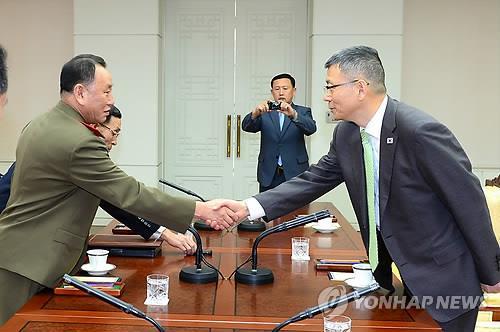- California Assembly OKs highest minimum wage in nation
- S. Korea unveils first graphic cigarette warnings
- US joins with South Korea, Japan in bid to deter North Korea
- LPGA golfer Chun In-gee finally back in action
- S. Korea won’t be top seed in final World Cup qualification round
- US men’s soccer misses 2nd straight Olympics
- US back on track in qualifying with 4-0 win over Guatemala
- High-intensity workout injuries spawn cottage industry
- CDC expands range of Zika mosquitoes into parts of Northeast
- Who knew? ‘The Walking Dead’ is helping families connect
N. Korea slams S. Korea for dismissing ‘proposals to ease tensions’

Ryu Je-seung, right, South Korea’s Deputy Minister for National Defense Policy, and Kim Yong-chol, who leads North Korea’s Reconnaissance General Bureau, shake hands before the military talks at the truce village of Panmunjom on Oct. 15, 2014. (Yonhap)
SEOUL (Yonhap) — North Korea bashed South Korea Thursday for “snubbing its suggestions aimed at easing tensions” made after a series of clashes near border regions, claiming such a stance jeopardizes the much-anticipated high-level talks.
On Wednesday, the two Koreas held the military talks at the truce village of Panmunjom and discussed a set of recent cases that heightened tensions on the Korean Peninsula, including last week’s exchange of fire between their patrol boats in the Yellow Sea.
The closed-door meeting, however, went nowhere, as the two “failed to narrow differences” on the pending issues, the defense ministry here said.
According to a lengthy report carried by the North’s Korea Central News Agency (KCNA) “to reveal the truth” about the inter-Korean talks, the communist country made several proposals to the South during the meeting on ways to prevent the recurrence of “the recent shameful incidents,” including seeking ways not to cross the sensitive sea border, stopping propaganda campaigns by sending leaflets and resolving issues via dialogue.
“But South Korea simply said it needs to take a close look at our proposals due to differences between the two Koreas caused by long being separated,” the report said, lashing out at the South for failing to make “any efforts to understand our sincerity.”
On Oct. 7, South and North Korean patrol boats briefly traded fire after a North Korean naval vessel violated the Northern Limit Line (NLL), the de facto maritime border between the two. Pyongyang has long disputed the line, claiming that it should be redrawn further south as it was unilaterally set by the U.S.-led United Nations Command at the end of the 1950-53 Korean War.
Three days later, the communist country fired anti-aircraft machine guns at balloons flown by the South Korean civic groups containing leaflets criticizing the authoritarian regime. After some of the rounds landed south of border, the two sides traded machine gun fire.
The incidents came days after high-ranking figures from the communist country made a surprise visit to South Korea and met with senior government officials here. The rare trip resulted in an agreement to hold another round of high-level talks in early November at the latest.
Earlier this week, South Korea suggested holding the second round of the meeting on Oct. 30, but the North has kept silent.
“It is an undeniable reality of the time that the inter-Korean high-level talks face risk of falling through,” the North said. “If (South Korea) sincerely hopes to improve the inter-Korean relations, it should accept our proposals.”
Pyongyang also criticized Seoul for “having been reluctant to hold the urgent inter-Korean contact itself.”
Since the day of the clash in the Yellow Sea, the North had sent a letter three times to the South’s national security adviser, Kim Kwan-jin, for an exclusive meeting.
But it took nine days for the South Korean government to agree to hold the talks and the South even fielded a lower ranking official than the North had expected, according to the KCNA.
During Wednesday’s talks, South Korea was represented by Ryu Je-seung, Deputy Minister for National Defense Policy, and the North by Kim Yong-chol, who leads the Reconnaissance General Bureau.
The communist North also refuted the South Korean government’s earlier explanation that it had tried not to make the military talks public in accordance with the request from Pyongyang, saying it first suggested Seoul hold an open meeting “to better follow the dear leader’s will to start the inter-Korean ties anew.”
“To sum up, (South Korea) completely refused and refuted to our proposals. Its stance not only disappointed but enraged the attendees,” the North said. “The South Korean authorities should keep in mind that the whole people keep a stern eye on their future steps.”
Expressing regrets over the North’s “distortion” of relevant facts and posing a threat to the South Korean civic groups over their anti-Pyongyang campaign, Seoul’s defense ministry called on Pyongyang to abide by the NLL and expressed hope for holding the high-level talks as agreed.
“With the aims of preventing military clashes in the Yellow Sea and building trust, our side had proposed the establishment of an inter-Korean hotline between the military authorities of the two Koreas (during the Wednesday’s talks),” the defense ministry said in a statement issued in response to the North’s report.
The ministry did not say how the North reacted to the suggestion, but the talks ended without any agreement.
Noting that the North has demanded the South’s government control the press and civic groups, the ministry said the demand is unacceptable. It also urged the North to stop attempting to nullify the NLL.
“We have been striving to improve the inter-Korean ties and relieve tensions, and expect the second round of the inter-Korean talks to be held as planned,” the ministry said.










![그룹 방탄소년단(BTS) [BTS 공식 트위터. 재판매 및 DB 금지]](http://www.koreatimesus.com/wp-content/uploads/2025/07/Untitled-5-copy-199x223.jpg)





